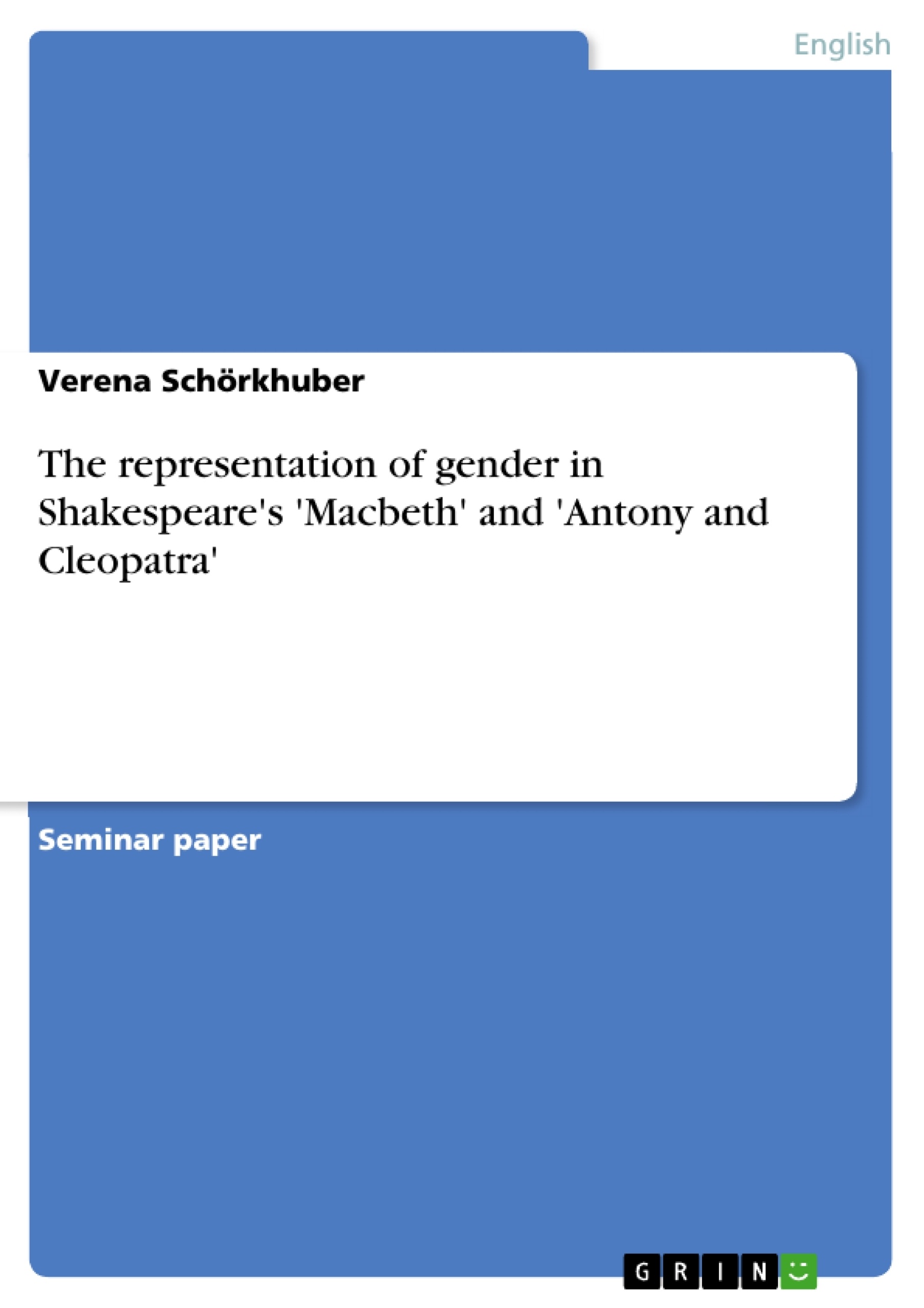Excerpt
Table of contents
1. INTRODUCTION
2. THE REPRESENTATION OF GENDER IN MACBETH
3. THE REPRESENTATION OF GENDER IN ANTONY AND CLEOPATRA
4. CONCLUSION
BIBLIOGRAPHY
Primary Literature
Secondary Literature
1. INTRODUCTION
Building on the assumption that differences between the sexes in tragedy are defined through competing representations of heroism, this paper shall take a closer look at the representation of gender in two premodern tragedies, Shakespeare’s Macbeth and Antony and Cleopatra. Needless to say, an essay of approximately 2,500 words can of necessity never include all aspects worth noting. Therefore, the main aim of this paper shall be to provide a short introduction to (Shakespeare) feminist criticism, which will be supplemented with an overview of various notable instances of the representation of gender in the two works mentioned.
Shakespeare feminist criticism is undoubtedly an essential site of exploration into developments in the field of literary criticism. As Lynda E. Boose remarks, Shakespeare’s works are a site of enormous cultural power, with his plays continuing to draw the attention of an extraordinarily wide range of scholars:
As such, he is not only a universally available but likewise a dangerously charged locale, where manoeuvres for appropriation, displacement, erasure, and the institutionalization of both cultural and academic privileges are invested with a particular energy that makes the politics within this field . . . the more crucial to recognize. (708)
Due to its increasing academic power, feminist criticism has exerted a great influence on Shakespeare studies, leading to innovations both in literary criticism in general and gender criticism in particular. Most importantly, the term ‘gender’ has emerged, enabling an analysis of the social constructions of ‘masculinity’ and ‘femininity’ (Barker & Kamps: 11).
As Valerie Traub points out in her essay ‘Desire and the Difference it Makes’, even though gender and eroticism are two inextricably related systems, ‘there is no simple fit between them. Gender is not equal to sexuality.’ (84)
Interestingly, in his survey of cultures through history and across the world, David Gilmore demonstrates that even though different cultures may offer varying definitions as to what constitutes masculinity, there seem to be certain parallels in the way masculinity is articulated. In contrast to biological maleness, ‘masculinity’ is not a natural given, but must be achieved; it is ‘a hortatory image that men and boys aspire to and that their culture demands of them as a measure of belonging’, with ‘[i]ts vindication . . . resting in rigid codes of decisive action in many spheres of life: as husband, father, lover, provider, warrior. A restricted status, there are always men who fail the test.’ (17)
The following discussion will show how Shakespeare, in the action of Macbeth and Antony and Cleopatra, examines sexual identity as shaped by the patriarchal culture in which he lived, by exploring the unconscious attitudes behind cultural definitions of manliness and womanliness.
2. THE REPRESENTATION OF GENDER IN MACBETH
At the heart of Macbeth, one finds a paradox of sexual confusion: Macbeth, a virile warrior-hero, is at the same time an ‘unfinished man’ (Kahn, Estate, 19) who murders because he has been convinced by his wife that only through violence will he achieve a state of heroism. His manhood, displayed in the utterly ‘masculine’ form of bloodshed, is not self-determined or innate, but rather infused into him by Lady Macbeth.
Both Lady Macbeth and Macbeth are fired by the same passion of ambition. However, while Macbeth is presented as violating moral law, Lady Macbeth seems to violate natural law: she is unfeminine (French 16). By eliminating in herself and her husband tenderness, pity and vulnerability to feeling – human qualities her culture tends to associate with women – Lady Macbeth becomes half man herself (Kahn, Estate, 151). Through his efforts to be supreme among all men, Macbeth re-enacts the ambivalence of his sexual identity: the more he tries to prove his masculinity, the greater his fusion with Lady Macbeth (Bradley 350).
Lady Macbeth’s power as a female temptress allies her in a general way with the witches. The disturbance of gender that Banquo registers when he first meets the witches is played out in Lady Macbeth’s attempts to unsex herself. Calling on spirits ambiguously allied with the witches, she phrases this unsexing as the undoing of her own bodily maternal function:
Come, you Spirits
That tend on mortal thoughts, unsex me here,
And fill me from the crown to the toe top-full
Of direst cruelty! Make thick my blood;
Stop up th’access and passage to remorse;
That no compunctious visitings of Nature
Shake my fell purpose nor keep peace between
Th’effect and it! (1.5.39-46)
While the witches work on Macbeth’s image of himself as king, Lady Macbeth works on Macbeth’s image of himself as man and tries to abash him with her own resolution:
I have given suck, and know
How tender ‘tis to love the babe that milks me:
I would, while it was smiling in my face,
Have pluck’d my nipple from his boneless gums,
And dash’d the brains out, had I so sworn
As you have done to this. (1.7.54-59)
Lady Macbeth’s understanding of masculinity is terribly conventional; for her, a man is one who acts: ‘Art thou afeard / To be the same in thine own act and valour / As thou art in desire?’ (1.7.39-41). Macbeth has more feeling for the limits of action: ‘I dare do all that may become a man; / Who dares do more, is none.’ (1.7.45-46) His wife makes her love for him dependent on the murder of Duncan, which she identifies as a test of his male potency: ‘From this time / Such I account thy love’ (1.7.38-39); ‘When you durst do it, then you were a man’ (1.7.49).
[...]
- Quote paper
- Verena Schörkhuber (Author), 2006, The representation of gender in Shakespeare's 'Macbeth' and 'Antony and Cleopatra', Munich, GRIN Verlag, https://www.grin.com/document/64092
Publish now - it's free






















Comments